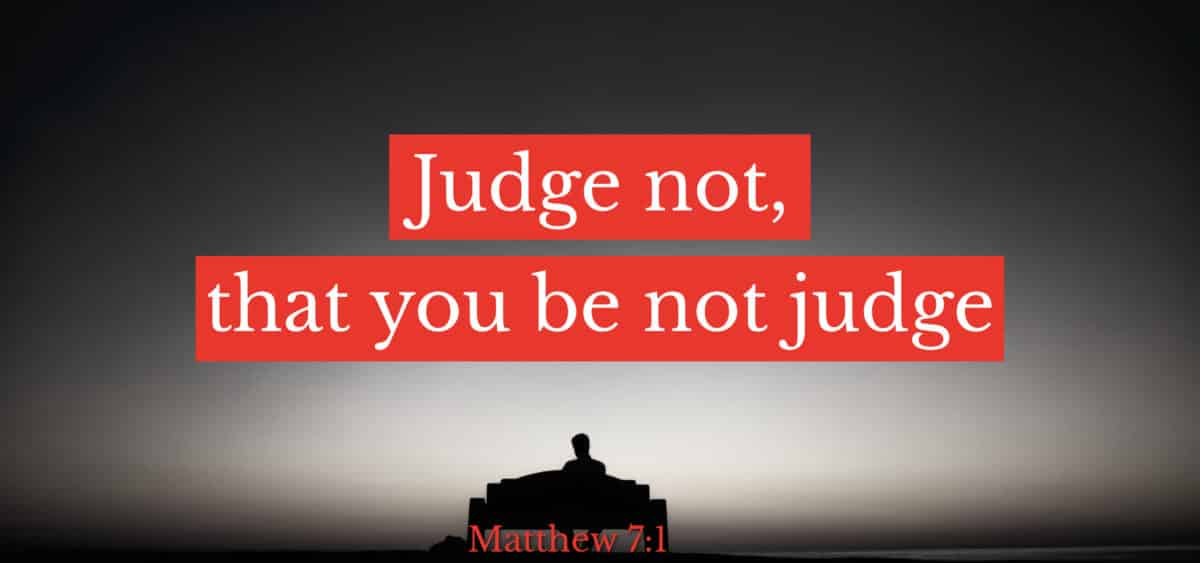“Judge not lest ye be judged” – Jesus (Matthew 7:1-2)
It just sounds best in KJV doesn’t it?
Almost everyone knows this verse. And at first glance, the message seems pretty straightforward. Should Christians judge? No… Jesus clearly says “Judge not lest ye be judged”.
Hold on… Is that really what this verse means?
We often use this verse as a trump card of sorts. Don’t judge me for my mistakes… otherwise Jesus will judge you. And this verse becomes a justification of sorts for our own actions.
The problem is if you’ve studied the life of Jesus you know this message doesn’t jive with how Jesus lived or what he taught. He “judged” people all the time. So, judge not lest ye be judged, has to mean something different.
In this post I want to unpack what Jesus meant when he said judge not. Because I think this verse has a powerful truth in it that we need today. And I think it’s a shame that this verse is so misused and abused that we often miss that point.
Let’s jump in. We’ll start by looking at the context in which Jesus said, judge not.
The Context Of Judge Not Lest Ye Be Judged
I want to start by looking at the context that we find judge not lest ye be judged in. Context is important because if we ignore the context in which a verse is said we can quite literally make the Bible say anything we want.
Jesus famously says judge not in Matthew 7:1 and a slightly different version in Luke 6:37. We will look primarily at Matthew as that one is the more popularly quoted passage. Matthew 7 starts off the last chapter of the Sermon on the Mount. In this sermon, Jesus has been giving one of the most detailed and difficult sermons we have recorded. It’s a great read; if you haven’t read it you really should. (Sermon on the Mount)
If you want to learn more about the Sermon on the Mount check out: The Beatitudes Explained Simply (Jesus’ most revolutionary teaching)
What Jesus does in this sermon is brilliant. He takes common beliefs and flips them on their head. Areas his audience thought they were doing good in, Jesus shows they still have work to do. Which leads to Matthew 7:1, judge not lest ye be judged in. Jesus is addressing an area that the religious elite struggled with. Judging others, I guess some things never change…
What Jesus does in the Sermon on the mount is raise the bar. He sets the expectations even higher. So let’s dive a little deeper into exactly what Jesus meant when he said judge not and how he elevates that expectation.

What Judge Not Really Means
If “judge not lest ye be judged” means that all Christians are to never offer any moral assessment, to never call out bad or good, then we are in trouble. Jesus contradicts that notion many times, included in just a few verses, but we will get to that in a minute.
This also isn’t a “do as I say and not as I do” type teaching. Jesus frequently tells his disciples to “judge,” Matthew 7:16 and Matthew 18:15 just to point out a few. Jesus doesn’t seem to have a problem with correcting people. So why would he tell us to not judge? Our definition of judge must be off.
Let’s look at the word Jesus uses. The word “judge” (krinó) can translate “to analyze” or “to evaluate.” At times it can even be translated “to condemn.” In context it makes sense that Jesus is telling us to condemn not. In many other places we are called to analyze and evaluate. But condemnation is something we are not called to do.
That’s what the religious of the day were doing; condemning others. They weren’t offering help and they certainly weren’t doing it in love. They were pushing others down so that they looked better. Jesus is directly pointing at their behavior and calling them out.
When Jesus told them to judge not, what he is telling them is to not condemn. Why? Because the stones they throw at others will ricochet back at them. In other words, they aren’t as innocent as they pretend to be. If they condemn others because of their mistakes they too will find themselves condemned by their mistakes (Matthew 7:2).
This verse is not saying that we should never point out the faults in others lives. We’ll see that clearly in the next few verses. What Jesus is warning about is HOW we judge. We are not to condemn, rather we are to help from a place of love.
We Are To Judge From A Place Of Love
After Jesus says the famous words, “judge not lest ye be judged,” in Matthew 7:1-2 he continues teaching to bring clarity to what he means. In Matthew 7:3, “Why do you look at the speck of sawdust in your brother’s eye and pay no attention to the plank in your own eye?”
This is what the religious leaders were doing. They were careful to not miss the smallest of sins in someone else’s life while ignoring the glaring sin in their own life. The reality is it’s usually easier and, if we are honest, it makes us feel better to point at other people’s faults rather than deal with our own.
Jesus continues on in Matthew 7:5, “You hypocrite, first take the plank out of your own eye, and then you will see clearly to remove the speck from your brother’s eye.”
This is what Jesus is getting after. Jesus never says we should not point out the speck. Rather that we should deal with our problems SO THAT we can help others deal with their’s.
Followers of Jesus have a responsibility to confront erring brothers and sisters. But we must do this in love and without judgement. After all, we are all sinners in need of a savior.
So many use this verse as an excuse to not listen about the faults others see in them. But that’s totally missing the point. When someone points something out in your life you should listen carefully. Every follower of Jesus should be getting the logs out of their eyes so they can see more clearly in order to help their brothers and sisters.
The point Jesus is making is that in order to help each other out we have to get our lives in order first. In other words the blind can’t lead the blind.
The religious of Jesus’ day (and today) like to point fingers. But that helps no one. What we should do is come alongside each other in love. It’s not judging to help someone see the sin in their life. It’s judging when we condemn them for that sin rather than helping them. There’s a big difference between the two.
So, Should Christians Judge?
Far too often this verse gets pulled out flippantly. Anytime people point out something in our life we throw this verse at them to show them why they are in the wrong. But we are supposed to offer correction to other Christians. We should not condemn; that’s not our job. But we should point out blind spots and potential errors. Not only is that okay, that’s what love requires isn’t it?
When someone is doing something that is dangerous or potentially damaging what is the loving thing to do? Every good parent analyzes and evaluates their kids right? In essence they judge their kids’ behaviors. They offer correction when needed. That’s the loving thing to do.
However, it’s not very loving to condemn. To scold your child and never tell them why is not loving or helpful. To condescendingly tell someone they are wrong, but not offer help or advice out of it is not loving. That’s condemning and that’s what we are called not to do.
The last question to answer is where to direct this healthy judgment. One of the pitfalls Christians often fall into is they judge the wrong people. Oftentimes Christians ignore the sins inside the church, but hyper-focus on the sins of those outside the church. That’s the opposite of our call. We are not to condemn anyone, especially those that are not following Jesus. Rather we are supposed to love them.
We should live out this verse within the context of Christian community, the church. We should correct each other in love because we genuinely want the best for each other.
Judge not lest ye be judged is a powerful reminder we need today. It’s a reminder to deal with our sin so that we can help those around us. It’s also a warning that the harshness we use to condemn those around us will also be used to condemn ourselves. Show grace and offer correction in love. That’s what Jesus modeled and we should too.
Take a moment and reflect on this passage. Are you condemning those around you? Are you ignoring the sin in your brothers and sisters’ lives? Or are you dealing with your sin so that you can help those around you? Spend a few minutes evaluating your life to see how you can follow what Jesus modeled for you.
- The Powerful Proverbs 27:17 Meaning (iron sharpens iron) - March 25, 2024
- What Is The Meaning Of James 1:17? (every good and perfect gift) - March 19, 2024
- Church, Your Hope Is Not In The Election. - March 19, 2024

